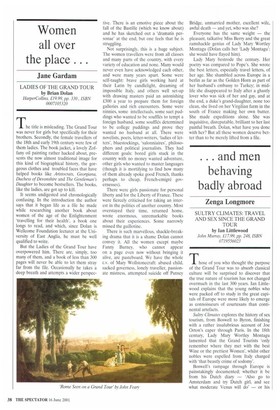Women all over the place. .
Jane Gardam
LADIES OF THE GRAND TOUR by Brian Dolan
HatperCollins, £19.99, pp. 330, ISBN 0007105320
The title is misleading. The Grand Tour was never for girls but specifically for their brothers. Secondly, the female travellers of the 18th and early 19th century were few of them ladies. The book jacket, a lovely Zoffany oil painting rather hacked about, presents the now almost traditional image for this kind of biographical history, the gorgeous clothes and troubled faces that have helped books like Aristocrats, Georgiana, Duchess of Devonshire and The Gentleman's Daughter to become bestsellers. The books, like the ladies, are got up to kill.
It seems undigested and chronologically confusing. In the introduction the author says that it began life as a file he made while researching another book about women of the age of the Enlightenment 'travelling for their health', a book one longs to read, and which, since Dolan is Wellcome Foundation lecturer at the University of East Anglia, he must be well qualified to write.
But the Ladies of the Grand Tour have overpowered him. There are, simply, too many of them, and a book of less than 300 pages will never be able to let them stray far from the file. Occasionally he takes a deep breath and attempts a wider perspec
tive. There is an emotive piece about the fall of the Bastille (which we know about) and he has sketched out a 'dramatis personae' at the end; but one feels that he is struggling.
Not surprisingly, this is a huge subject. The women travellers were from all classes and many parts of the country, with every variety of education and none. Many would never even have acknowledged each other, and were many years apart. Some were self-taught: brave girls working hard at their Latin by candlelight, dreaming of impossible Italy, and others well set-up with drawing masters paid an astonishing £300 a year to prepare them for foreign galleries and rich encounters. Some were ninnies, some intellectuals, some suet puddings who wanted to be souffles to tempt a foreign husband, some souffles determined to be college puddings and prove they wanted no husband at all. There were novelists, poets, letter-writers, 'ladies of letters', bluestockings, `salonniaires', philosophers and political journalists. They had different goals: bored girls stuck in the country with no money wanted adventure, other girls who wanted to master languages (though it is mortifying to find how many of them already spoke good French, thanks perhaps to cheap, French-emigre governesses).
There were girls passionate for personal liberty and for the Liberty of France. These were fiercely criticised for taking an interest in the politics of another country. Most overstayed their time, returned home, wrote enormous, unremarkable books about their experiences. Some narrowly missed the guillotine.
There is such marvellous, shackle-breaking drama that it is a shame Dolan cannot convey it. All the women except maybe Fanny Burney, who cannot appear on a page even now without bringing it alive, are pasteboard. We have the whole c.v. of Mary Wollstonecraft: abused child, sacked governess, lonely traveller, passionate mistress, attempted suicide off Putney Bridge, unmarried mother, excellent wife, awful death — and yet, who was she?
Everyone has the same weight — the pleasant, talkative Miss Berry and the great ramshackle genius of Lady Mary Wortley Montagu (Dolan calls her 'Lady Montagu': she would have flayed him).
Lady Mary bestrode the century. Her poetry was compared to Pope's. She wrote the best letters, especially travel letters, of her age. She shambled across Europe in a berlin as far as the Golden Horn as part of her husband's embassy to Turkey; in midlife she disappeared to Italy after a ghastly lover who was sick of her and gay, and at the end, a duke's grand-daughter, none too clean, she lived on her Virgilian farm in the south of France making her own butter. She made expeditions alone. She was inquisitive, disreputable, brilliant to her last painful breath. Dolan, what have you done with her? But all these women deserve better than to be merely lifted from a file.


































































 Previous page
Previous page